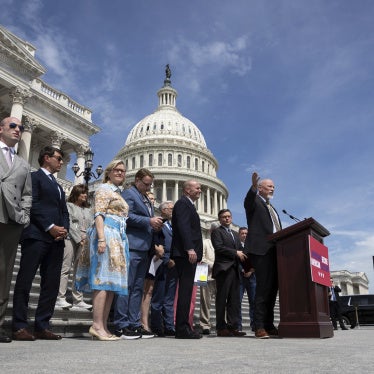Amnesty International USA and Human Rights Watch are calling on members of Congress to question Colombian Defense Secretary Juan Manuel Santos during his two-day trip to Washington about the steep rise in reports of extrajudicial executions by the Colombian military.
The organizations called on Congress to maintain a hold on US$55 million in military assistance until substantial progress is made in addressing key human rights concerns. Defense Secretary Santos is currently in Washington on a two-day visit.
“Colombia’s defense secretary must explain to Congress why there has been a dramatic rise in reports of extrajudicial executions of civilians by the armed forces over the past several years, and why these killings continue to this day,” AIUSA and HRW said. “By maintaining the hold on military aid, Congress will continue to send a clear signal that US money will not flow freely to the military until these reports are thoroughly investigated and appropriate remedial action is taken.”
Last March, Secretary of State Condoleezza Rice certified the release of $55.2 million in military funds to Colombia after vouching for the country’s progress in human rights in a 56-page “Memorandum of Justification.” Only one paragraph in the document made reference to cases of extrajudicial executions.
Earlier that month, however, the UN High Commissioner for Human Rights (UNHCHR) reported that the executions were not isolated events but rather were occurring “in various units over a large area of the country” and were becoming “increasingly common.” The UNHCHR demanded “far-reaching measures.” Congress then put a hold on the release of the funds.
Some of the executions are reportedly being committed by military units that have received US military aid and by units operating under the guidance of US military advisers, according to Amnesty International.
An international mission of legal experts accompanied by Colombian organizations recently traveled to different parts of the country to examine the reports of extrajudicial executions and impunity for members of the security forces. A coalition of Colombian human rights groups had previously documented the serious human rights violations. AIUSA and HRW have also gathered information on such cases.
“This is an extremely delicate time in Colombia,” the two organizations said. “Congress needs to send the clear message that, consistent with US law, the release of the funds will depend on Colombia making substantial progress on human rights.”
Reports of extrajudicial executions are thought to be in the hundreds annually. Various reports show a pattern of soldiers allegedly killing civilians and presenting them as guerrillas killed in combat. Investigations, when pursued, are often done under military jurisdiction, and more often than not, are inadequate.
AIUSA and HRW said the US government, which has advised Colombia on reforming its military justice system, must now tell the Colombian government that cases implicating the security forces in human rights violations must once and for all be excluded from military courts.
Rather than take the issue of extrajudicial executions seriously, Colombian President Alvaro Uribe in a July speech claimed that “the guerrillas have another strategy: every time there is a casualty in the guerrillas, they immediately mobilize their chorus leaders in the country and abroad to say that it was an extrajudicial execution.”
Uribe has repeatedly made statements attempting to link human rights groups to Colombia’s guerrilla groups, which for decades have been responsible for serious and repeated violations of international humanitarian law.
AIUSA and HRW also noted that there has been no significant progress in a number of high-profile cases of human rights violations implicating the military. One example is the case of General Rito Alejo del Río, whose US visa was revoked several years ago due to evidence that he had collaborated with paramilitaries in human rights violations when he commanded the 17th Brigade of the Colombian Army. Early in the Uribe administration, the investigation was summarily closed. Paramilitary commander Salvatore Mancuso has recently stated in hearings before prosecutors that Del Río had, in fact, collaborated with his group. Prosecutors have yet to reopen any investigation into the allegations against Del Río.
Another case of concern to the organizations is the February 2005 massacre of eight people in the Peace Community of San José de Apartadó. AIUSA and HRW welcome the decision of Colombia’s Attorney General’s Office to call on 69 soldiers to testify in connection with the massacre.
“Unfortunately, instead of fully supporting this serious investigation, Defense Secretary Santos questioned the prosecutors’ decision,” said AIUSA and HRW.
Concerns also remain about the more than 160 killings of Peace Community members since 1997, most of which were reportedly committed by paramilitaries and the security forces who have not been prosecuted.
Given concerns about military aid and the critical human rights situation in the country, the Colombian government should fully comply with repeated UN human rights recommendations.








